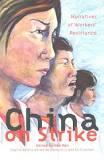 China has the world’s largest population, about 1.4 billion people, with a working age population of about 950 million, hundreds of millions of them wage laborers. Most of us know little about the Chinese workers or the recent workers’ movement that has developed so rapidly, especially since the 1990s.
China has the world’s largest population, about 1.4 billion people, with a working age population of about 950 million, hundreds of millions of them wage laborers. Most of us know little about the Chinese workers or the recent workers’ movement that has developed so rapidly, especially since the 1990s.
Workers’ Stories of their Strikes in China
Demystifying Maoism – Book Review
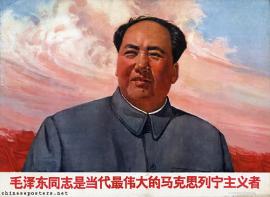
Elliott Liu. Maoism and the Chinese Revolution: A Critical Introduction. Oakland: PM Press, 2016. 148 pages. Bibliography. Notes. Photos. Tables.
During the 1960s and early 1970s, Maoism became the dominant political tendency not only in China but also in Western Europe and the United States, while it also influenced developments in Asia, Latin America and Africa. In the United States thousands of young activists rallied to Maoism, a political theory and practice that appeared at the time to be a democratic alternative to the bureaucratic Communism of the Soviet Union.
Tiananmen Mothers Urge Leaders to Take Historical Responsibility for June Fourth
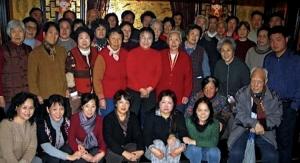
A quarter century has passed since the June Fourth Massacre that took place in Beijing, China’s capital, near the end of the last century. But the truth of this tragedy has to this day not been laid bare to the world, and the massacre victims, who have still not received justice, cannot rest in peace. This is a disgrace for the whole Chinese people, and a disgrace for all of civilized humanity!
Hong Kong, Ferguson and New York City! Solidarity Statement with Black Communities in Ferguson, Missouri and NYC
The following statement from Left 21 in Hong Kong was written in early December as the pro-democracy activists there were being driven from the streets. – Dan La Botz, Co-Editor
From Hong Kong to Ferguson and NYC, we send you our warmest solidarity!
What They's Talking about on the Streets in Hong Kong
After Sunday night, when many people feared that there might be a crackdown on the protests after following several pleas for protesters to leave the sites and the government’s warning that civil servants must be able to return to work the next day, this week the protests have nevertheless continued.
Hong Kong – Statement from Four Organizations Calling for a Tactical Retreat and a Report
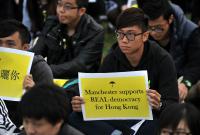
Today [October 3] Hong Kong’s rule of law and basic human rights were totally violated. In Mong Kok, Causeway Bay and Tsim Tsa Tsui fascist thugs and gangs to different extents attacked the peaceful occupiers, resulting in hundreds of injuries. We condemn this most severely. A variety of circumstantial evidence points to the conclusion that Beijing is the biggest suspect behind these thugs and gangs.
Hong-Kong – Chinese Government Sends in its Mafia
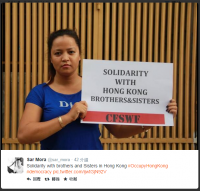 The following is a report from an on-the-ground source in Hong Kong. – Editors
The following is a report from an on-the-ground source in Hong Kong. – Editors
The government is mobilizing its mafia extensively. Since noon, the government has started mobilizing gangsters to provoke the public. It is hard to imagine that the government is lining up with the mafia but it now happens during the CY Leung’s administration. This is something expected and no need to be shocked about it.
Looking at the current situation, the government hopes to shift Occupy Central with Love and Peace into a massive riot and make the Hong Kong public angry with the protesters.
Occupy Central–What’s Next for the Hong-Kong Democracy Movement? A Brief Observation on the Current Movement
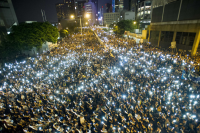
(An earlier version was translated by Bai Ruixue, but since then the Chinese version had been revised and partially translated by the author.)
Monday 29th September 2014/Occupy Central Day 3 – Occupy central continues to grow by leaps and bounds.
China’s Emergence as an Imperialist Power
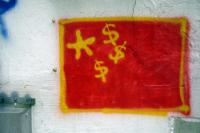 One of the most important issues in world politics today is China’s rise as a great imperialist power. Most left-wing writers consider China either as a “socialist country,” a “deformed workers’ state,” or as a “dependent capitalist country” exploited by Western monopolies.
One of the most important issues in world politics today is China’s rise as a great imperialist power. Most left-wing writers consider China either as a “socialist country,” a “deformed workers’ state,” or as a “dependent capitalist country” exploited by Western monopolies.
China: From Bureaucratic Communism to Bureaucratic Capitalism
The election last week of Xi Jinping to the chairmanship of the Chinese Communist Party (CCP), together with six others who with Xi constitute the Standing Committee of the Political Bureau of the party, represents entrenchment of what the Chinese Marxist intellectual Au Loong Yu has called “bureaucratic capitalism.”[1] The bureaucratic capitalists, many of them princelings, that is, sons of the founders of China’s Communist government, have through their control of the state and crony state-corporation relationships come to dominate the heart
Movie Review: “Death by China,” a film by Peter Navarro
To call this feature-length film xenophobic, fear-mongering and hysterical almost understates the case. The whole thing is so over-the-top that, like a bad horror movie where you can see the strings moving the monster, it leaves us numbed and bored or perhaps laughing. Yet it’s not funny.
How Socialist Is the Chinese Party State?
The publisher of Wang Hui’s book described it as follows: "arguing that China’s revolutionary history and its current liberalization are part of the same discourse of modernity, Wang Hui calls for alternatives to both its capitalist trajectory and its authoritarian past."
What follows is our review of the book in the light of this description: how far this assessment is correct, and how relevant it is for those social activists who are pursuing just such an alternative in China.
Liu Xiaobo and the Nobel Peace Prize – Debate within China
A fascinating analysis of Liu Xiaobo and the Nobel Peace Prize has been circulating in Europe but has not, to my knowledge, been reprinted in the US, in print or online. Au Loong Yu, who wrote about China for the New Politics symposium on labor’s response to the global economic collapse, rejects the premises of a debate that is “primarily between the liberals who support Liu Xiaobo and the nationalists is essentially a debate of either Washington or the
Village Elections in China — Democracy or Façade?
Do elections of self-governing Village Committees in China's signify a major step towards democracy? How, if at all, do these elections affect power relations among various groups, class strata, and nascent or even actual classes in the Chinese countryside? Inside and outside of the villages, who makes decisions about how the village will evolve or develop?
China: End of a Model…Or the Birth of a New One?
CHINA’S THIRTY YEARS OF NEARLY UNINTERRUPTED HIGH GROWTH has encountered great challenge as the global economic crisis has hit China’s export hard. Since China’s trade as a percentage of GDP is as high as 70 percent, the export-led growth mode has practically ended. The Chinese Communist Party (CCP) is aware of this. Back in April, 2008 President Hu Jintao spoke of the need to change the mode of development from export-led growth to domestic-led growth by expanding domestic demand.
